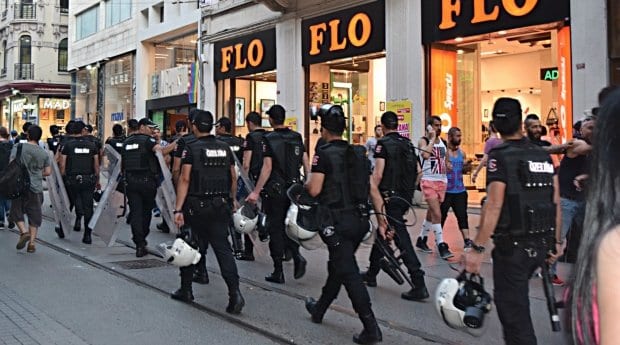Istanbul’s lesbian, gay, bisexual, transsexual and intersex (LGBTI) community is bracing itself for possible attacks after a violent police crackdown on the thousands that turned up for the Istanbul Pride March on June 28.
Just a few hours before it was scheduled to begin, the Istanbul Governor’s office cancelled the Pride parade saying that it conflicted with the Muslim holy month of Ramadan. Now members of the LGBTI community say that by tying the cancellation of the parade to Ramadan, officials are sending a message to the Turkish community that being LGBTI and being Muslim are opposing ideas that cannot coexist.
“It purposefully ignores the fact that LGBTI individuals can come from all walks of life, and aims to demonize them in the eyes of the wider public, preparing the ground for future attacks against LGBTI individuals,” the LGBTI Pride Committee said in a statement.
Hundreds of Pride flags waved and the crowd chanted, “Where are you, my love? Here I am, my love,” before the “pop, pop, pop” of tear gas and rubber bullets from Turkey’s special police forces muffled the Pride participants in downtown Istanbul June 28.
Terry Reintke, a member of the European Parliament and its LGBTI intergroup, was in attendance at the Pride march and later told Daily Xtra that Sunday was a sad day for human rights in Turkey.
“The violent police behaviour toward the Pride participants do not only mark an attack on LGBT rights, but also a breach of freedom of assembly,” she said.
“For more than 10 years each year a peaceful Pride gathered in the streets of Istanbul. Using pretexts to make this celebration of diversity and freedom impossible is an attack on democracy in Turkey,” she said.
Istanbul’s LGBTI Pride Committee issued a press release after the governor’s last-minute cancellation asking marchers to gather as planned. A crowd of close to 100,000 attempted to march down the city’s main thoroughfare, Istiklal Street, when police launched their attack.
Several people were injured after being overcome by the tear gas ,and a number of journalists reported being roughly handled, including KaosGL editor Yildiz Tar, who told Daily Xtra he was detained for a short while before being released.
Police managed to push the marchers out of the main centre so the parade spilled onto side streets. Despite being pushed off course, the march took place on the streets north, south, east and west of the original route.
Tear gas and rubber bullets flew well into the evening in various parts of the city centre where Pride week attendees were gathered, including at the private venue for the official Pride Week closing party.
The Istanbul Governor’s Office has claimed that organizers did not inform the office about the Pride event. The office also indicated that special police forces were brought in after reports indicated that there was the possibility of a provocation.
It is speculated that the parade cancellation may be political as both the governor and the mayor of Istanbul are members of the very conservative Justice and Development Party (AKP), which up until June 7 was also the ruling party.
In a country where politicians are openly homophobic, the recent elections proved to be a small victory for the LGBTI community. A total of 22 members elected to parliament are open supporters of gay rights
Prior to the election, LGBTI activists launched a campaign aimed at getting electoral candidates to sign a pledge to support gay rights. Some 64 candidates signed the pledge and 22 of those slid into victory seats. Of the 22 LGBTI supporters that managed to win electoral seats, none are members of the AKP.
The overall election results also proved that change is in the air. The ruling AKP failed to secure the 330 seats required for a parliamentary majority, paving the way for several left-wing parties to gain more power in parliament.
The Republican People’s Party (CHP) managed to secure 132 seats, keeping it in the major opposition chair. The leader of the CHP, Kemal Kilicdaroglu, publicly said that no one should be allowed to interfere in other’s private lives when questioned about same-sex partnerships.
The People’s Democratic Party (HDP), which ran independents in the 2011 election in order to ensure it could get candidates into parliament despite the 10 percent election threshold (which blocks parties that win less than 10 percent of the vote), ran as a party this time and managed to secure 80 seats. The HDP is an open supporter of the LGBTI community.
At least three HDP MPs and a CHP MP were hit by plastic bullets after facing off with police and demanding that police stop the attack against the Pride crowd.
The Boston Men’s Gay Chorus which was in the headlines during Pride week after having its concert cancelled without reason was also stopped from entering the city’s main street along with the thousands of others. The chorus was in town to perform at the Zorlu Center, but was informed several days prior that the show would not go on.
Istanbul’s Bogazici University’s LGBTI Student Union offered to host the group instead, allowing the chorus to perform a free outdoor concert the day before the Pride march was to take place.

 Why you can trust Xtra
Why you can trust Xtra


